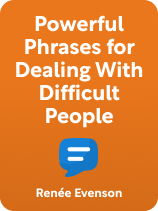

This article is an excerpt from the Shortform book guide to "Powerful Phrases for Dealing With Difficult People" by Renee Evenson. Shortform has the world's best summaries and analyses of books you should be reading.
Like this article? Sign up for a free trial here.
Are you stuck in the middle of a dispute? What steps can you take to ensure both parties walk away satisfied?
In Powerful Phrases for Dealing with Difficult People, Renée Evenson takes people through a process of resolving conflict. She outlines two crucial steps at the end: confirming the decision and affirming the relationship.
Read on to learn how to end a conflict with clarity and grace.
Ending the Conflict
Evenson provides advice on how to end a conflict, providing two final steps in her conflict resolution process. She states that, after both sides have proposed potential fixes, you must definitively decide how to resolve the issue. Ideally, someone will propose a solution that both parties gladly accept, ending the conflict.
Let’s discuss two important steps of ending a conflict: Confirming a decision and affirming the relationship.
#1: Confirm Your Decision
Evenson suggests that once you’ve identified a solution that makes both of you happy, repeat it to ensure the other person fully understands and accepts it. For instance, say something like, “Great. I’ll stop emailing you asking for updates if you meet with me every Monday to review your team’s progress.” This added clarity helps prevent misunderstandings and future conflicts.
(Shortform note: A common piece of advice in business management is that if you want your employees to remember and act on important information, you should repeat it as much as you can, in different forms. This approach may be helpful after conflict resolution, too: Instead of just recapping the final decision once, find different ways to repeat and reinforce it to make it more likely that the other person will remember to comply. For instance, write a follow-up email summarizing the decision, and repeat the message with your actions by publicly holding up your end of the deal.)
#2: Affirm the Relationship
Finally, Evenson recommends ending your conversation by expressing how happy you are that you were able to come to an agreement and how much you appreciate your relationship with the other person. For instance, you might say, “I’m happy we could work this out! I’m excited to see what we’ll be able to accomplish together next.”
This kind of conclusion leaves a lasting positive impression on the other person and makes them feel a stronger bond with you.
(Shortform note: In The 5 Love Languages, Gary Chapman recommends expressing words of affirmation about your romantic partner to other people as well as directly to them. This way, others might let them know how much your relationship with them means to you, confirming that your words are genuine. Arguably, this advice applies equally well outside of romantic relationships: Imagine you tell your co-workers that your difficult office neighbor was kind enough to compromise with you. If that office neighbor hears someone mention that you thought they were kind, it’ll strengthen their bond with you.)

———End of Preview———
Like what you just read? Read the rest of the world's best book summary and analysis of Renee Evenson's "Powerful Phrases for Dealing With Difficult People" at Shortform.
Here's what you'll find in our full Powerful Phrases for Dealing With Difficult People summary:
- The downsides of avoiding conflict
- How to keep people from getting defensive
- What to do before you attempt conflict resolution






